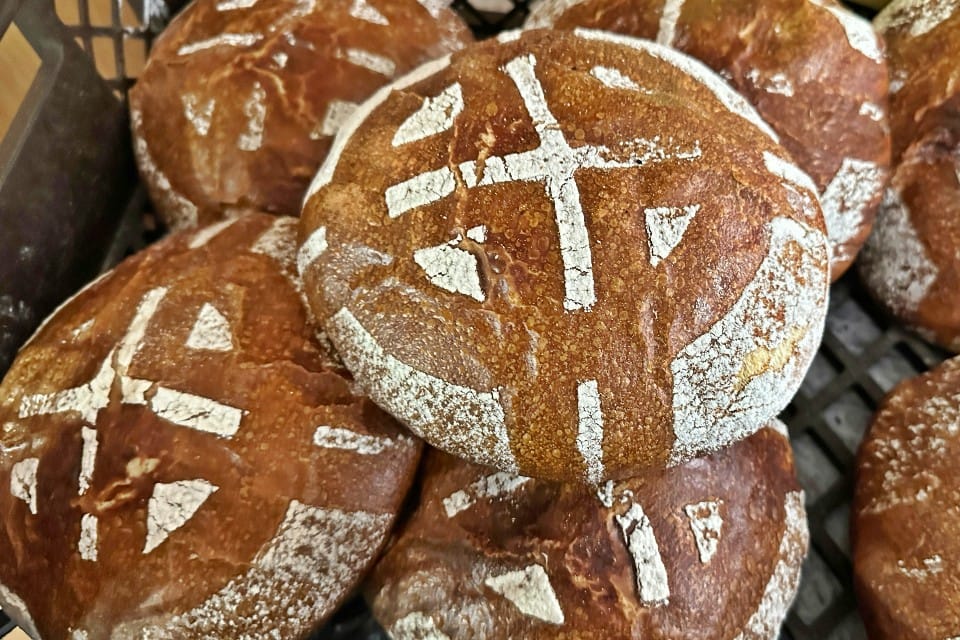

"Come and dine." —John 21:12 (KJV)
Before the rise of modern kitchens, before measured recipes and polished silver, there was manna gathered at dawn, olives pressed underfoot, and barley loaves broken in gratitude. The Scriptures, though not written as a culinary guide, offer a feast of divine provision—meals woven into the fabric of covenant, survival, and sacred celebration. Here, we gather these holy dishes, prepared as they were in ancient times, with reverence for their spiritual significance.
We begin our journey with dishes from the Hebrew Bible and the New Testament, the foundation upon which so many faiths built their own traditions of sacred sustenance.
Jump to Recipe:
- 🍞 Unleavened Bread
- 🍲 Red Lentil Stew
- 🌾 Ezekiel’s Survival Bread
- 🫓 The Widow’s Last Cake
- 🐑 Passover Lamb with Bitter Herbs
- 🍇 Fig and Raisin Cakes
- 🐟 Fish Upon the Coals
🍞 Unleavened Bread
"And they shall eat the flesh in that night, roast with fire, and unleavened bread; and with bitter herbs they shall eat it."
—Exodus 12:8
Ingredients:
- 2 cups fine flour
- Water (enough to bind)
- Pinch of salt (as desired)
Preparation:
- Combine flour and water swiftly, leaving no time for leaven.
- Knead into a firm dough, then flatten into thin rounds.
- Bake upon hot stones or a dry pan until lightly browned.
Sacred Significance:
This bread recalls Israel’s flight from Egypt—no yeast, no delay. It is the taste of deliverance, eaten in haste yet remembered for generations.
🍲 Red Lentil Stew
"Then Jacob gave Esau bread and pottage of lentils; and he did eat and drink..." —Genesis 25:34
Ingredients:
- 1 cup red lentils
- 3 cups water
- Season with salt and the wild onions or garlic. (as available)
Preparation:
- Rinse lentils, then simmer in water until tender.
- Season with salt and wild herbs.
- Serve with coarse barley bread.
Sacred Significance:
A simple stew, yet potent enough to trade a birthright. A reminder that hunger can cloud judgment, and that God’s blessings are not so lightly exchanged.
🌾 Ezekiel’s Survival Bread
"Take thou also unto thee wheat, and barley, and beans, and lentils, and millet, and fitches..." —Ezekiel 4:9
Ingredients:
- ½ cup wheat
- ½ cup barley
- ¼ cup lentils
- ¼ cup millet
- ¼ cup spelt (fitches)
- ¼ cup beans
- Water
Preparation:
- Grind grains and legumes into coarse flour.
- Mix with water into a dense dough.
- Form into cakes and bake over embers.
Sacred Significance:
The prophet’s ration, divinely appointed for endurance. A blend of hardship and providence, this bread sustained Ezekiel as he bore the weight of God’s message.
🫓 The Widow’s Last Cake
"I have not a cake, but an handful of meal in a barrel, and a little oil in a cruse..." —1 Kings 17:12
Ingredients:
- 1 handful flour
- A drizzle of oil
- Water
Preparation:
- Mix meal and oil with scant water.
- Press into a small cake.
- Bake upon a heated stone.
Sacred Significance:
What seemed a final meal became a miracle of unending supply. This cake is faith made edible—a testament that God sustains even in famine.
🐑 Passover Lamb with Bitter Herbs
"Roast with fire; his head with his legs, and with the purtenance thereof."
—Exodus 12:9
Ingredients:
- 1 unblemished lamb
- Bitter herbs (horseradish, endive, or dandelion greens)
- Unleavened bread
Preparation:
- Roast the lamb whole over fire.
- Serve with herbs and flatbread.
- Consume entirely before dawn.
Sacred Significance:
The first Passover meal—a lamb’s blood spared Israel, and its flesh nourished them for flight. The bitterness recalls slavery; the haste, their deliverance.
🍇 Fig and Raisin Cakes
"An hundred clusters of raisins, and two hundred cakes of figs..."
—1 Samuel 25:18
Ingredients:
- 2 cups dried figs
- 1 cup raisins
- Honey (optional)
Preparation:
- Mash figs into paste, blend with raisins.
- Shape into small rounds.
- Dry in sun or over warm stones.
Sacred Significance:
Gifts for kings, rations for warriors, these sweet cakes were tokens of honor and God’s fruitful provision.
🐟 Fish Upon the Coals
"They saw a fire of coals there, and fish laid thereon, and bread."
—John 21:9
Ingredients:
- Fresh fish (tilapia or sardines)
- Barley bread
- Sea salt
Preparation:
- Clean fish, season lightly.
- Grill over charcoal until flaky.
- Serve with broken bread.
Sacred Significance:
The resurrected Lord cooked this meal—a breakfast of reconciliation. Here, Peter’s denial was undone, and the call to "feed my sheep" was given.
Final Blessing: The Table of Remembrance
From Eden’s forbidden fruit to the Marriage Supper of the Lamb, Scripture frames food as sacred. It is manna in the wilderness, oil that does not fail, and bread broken in love. To eat these dishes is to taste history, to chew on covenant, to savor God’s faithfulness.
"O taste and see that the Lord is good."
—Psalm 34:8
May your kitchen be an altar, your meals a liturgy of gratitude.
Amen.
Coming Soon in This Series: A continued exploration of scriptural sustenance across traditions.
- Daniel’s Pulse (Vegetables & Water) — Daniel 1:12 (A defiance of royal feasts, proving God’s nourishment surpasses luxury.)
- Honey from the Rock — Deuteronomy 32:13 (Wild honey, a symbol of God’s unexpected sweetness in barren places.)
- Spiced Wine of Solomon — Song of Solomon 8:2 (A drink of celebration and bridal joy.)
